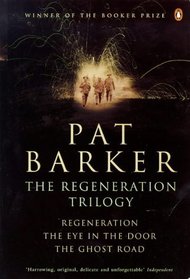Search -
The Regeneration Trilogy
The Regeneration Trilogy
Author:
1) Regeneration In 1917, decorated British officer and poet Siegfried Sassoon wrote a declaration condemning the war. Instead of a court-martial, he was sent to a hospital for other "shell-shocked" officers where he was treated by Dr. William Rivers, noted an thropologist and psychiatrist. Author Barker turns these true occurrences int... more »
Author:
1) Regeneration In 1917, decorated British officer and poet Siegfried Sassoon wrote a declaration condemning the war. Instead of a court-martial, he was sent to a hospital for other "shell-shocked" officers where he was treated by Dr. William Rivers, noted an thropologist and psychiatrist. Author Barker turns these true occurrences int... more »
ISBN-13: 9780140257687
ISBN-10: 0140257683
Publication Date: 1/10/1998
Pages: 608
Rating: ?
ISBN-10: 0140257683
Publication Date: 1/10/1998
Pages: 608
Rating: ?
0 stars, based on 0 rating
Publisher: Penguin Books Ltd
Book Type: Paperback
Other Versions: Hardcover, Audio Cassette
Members Wishing: 0
Reviews: Amazon | Write a Review
Book Type: Paperback
Other Versions: Hardcover, Audio Cassette
Members Wishing: 0
Reviews: Amazon | Write a Review
Genres:




